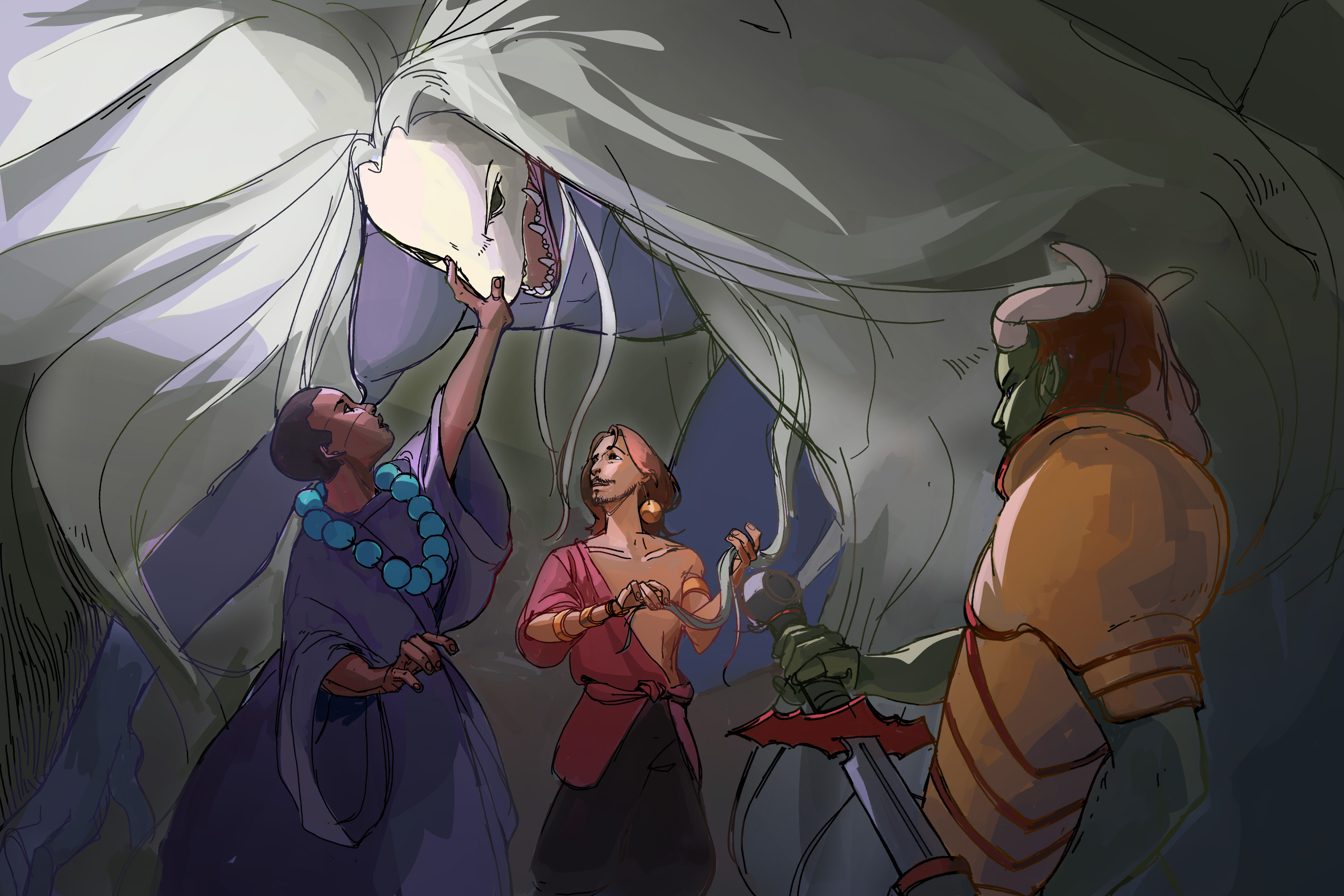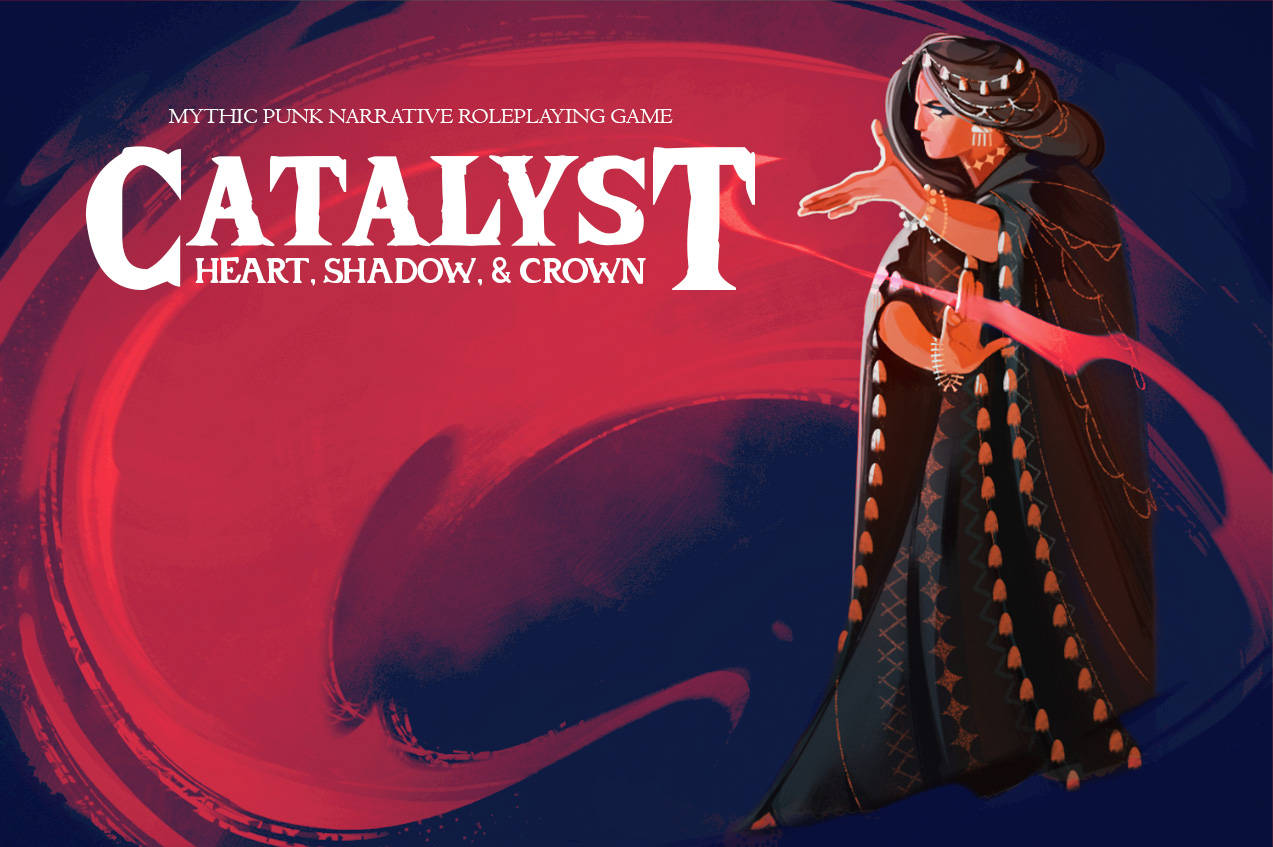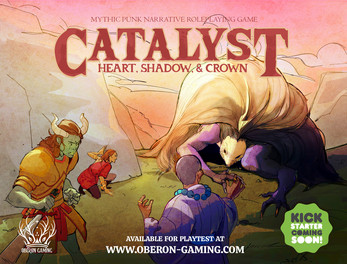Catalyst RPG
A downloadable TTRPG
Catalyst: Heart, Shadow, and Crown
Catalyst at a glance
Catalyst is a narrative-driven, tactical TTRPG about choice, consequence, and surviving the chaos after the fall of the gods.
Player count: 1 GM + 1–5 players.
Session length: a few hours per session.
What you need: a set of dice, pencils, and a table that likes hard choices.
How it plays: approach-based protagonists, player-facing rolls only, success is rarely clean, failure keeps the story moving.
Tone: mythic, post-divine, beautiful ruin with sharp teeth.
Best for: groups who like to play with consequences, spotlighting collaboration, and making tactical decisions without heavy bookkeeping.
What you get in the download
This release is a playable playtest draft, with the full core rules, starter threats and environments, and guidance for GMs on framing scenes and building encounters.
Included files: Catalyst Playtest Beta (main book) and Catalyst: Spark (one-sheet micro version).
How to Start
Read the core resolution and consequence rules first, then skim character creation, then run a single scene as a tutorial.
Scene recipe: put the characters in motion, present one clear risk, make them declare intent and approach, set a difficulty, roll, and let consequences reshape the situation.
You do not need to master the whole book before running it. Run a scene, learn what the table reaches for, then go deeper.
Catalyst: Spark
Spark is a one-sheet micro version of Catalyst designed for fast pickup games, convention play, and learning the core loop without the full book.
Use it when you want the vibe and the consequences, but you want to start playing in minutes.

About Catalyst
Catalyst is a narrative-driven, tactical role-playing game about consequence, identity, and surviving what the gods left behind.
It is set in the Eschaton, a mythic, post-divine world where reality has started to unravel after the death of the gods. The shimmer of primal magic warps everything it touches. The restless dead pierce the Veil, finding no rest. And the dreams and nightmares of the living creep into the waking world. It’s a place of quiet ruin and dangerous beauty, where miracles are commonplace, but always come at a steep cost.
Catalyst uses an approach-based system where players are tasked with creating protagonists rather than selecting attributes, skills, and class abilities. Their core stats (if you can call them that) are tied directly to the characters' personalities - their drives, vices, and beliefs. Their abilities and skills stem from their origins - where they came from, why they left, and the paths they took along the journey. Your approach, the context you bring, and the cost you accept shape every outcome.
That is because, at its core, Catalyst is a run on trust. Its rules foster deep collaboration between players and GMs, rather than focusing on adherence to prescriptive rules. Players are rewarded for engagement, creativity, and description, while GMs set the game's tone through difficulty thresholds and open narration.
It's a game where success is rarely clean; failure never halts momentum. Wounds wear you down by shrinking the tools you rely on. Spellcasting is a risky dance of creative interpretation and meaningful cost. The only resource tracking involves your character’s will and resolve. And instead of gaining experience through victory and plunder, characters grow by confronting the foundations of who they are and what they seek to accomplish.
Catalyst is for the players who lean in. Those who take the risky move not because it's optimal, but because it means something, and welcome scars for the stories they tell.
Pillars of the Game
Consequence First. Every action has weight when nothing happens in a vacuum. Players declare intent and method, and the world responds accordingly. Failure is never dead air; it is a turn in the road.
Fiction-Driven Resolution. The dice are tools, not tyrants. You roll when the fiction demands risk, not because a rule says so. Outcomes exist on a spectrum, shaped by context and approach. Even catastrophe tells a story worth following.
Simple Framework, Tactical Depth. Catalyst is light on tracking and heavy on decisions. The tension lives in how you spend your dice, when you hold back, and what you are willing to sacrifice. The system is built to get out of the way, then cut deep when it counts.
Magic Is Not a Spell List. Magic is the narrative alchemy of intent, belief, trauma, will, and sacrifice. It does not follow rules; it exists only to break them. It is mystery, force, and fracture. Every spell is personal. Every casting one of a kind. The only law it obeys is the cost it demands from you.
Player-Focused Play. All rolls come from the players. Enemies do not roll. They apply pressure, shift difficulties, drain resolve, and make the world burn. This keeps the pace taut and the spotlight where it belongs: on player action and agency.
Language as a System. The foundation of Catalyst is open literary interpretation. Its rules and narrative are inseparable. Traits are not just bonuses; they are story hooks. Scars shape what you become. Catalyst's mechanics speak the same language as its fiction, letting drama rise from narrative structure, not in spite of it.
Scars over Scores. Character growth in Catalyst does not follow a ladder, it traces a spiral. You do not get stronger by stacking numbers. You change by enduring, sacrificing, and adapting. Your character arc is mechanical. Your wounds shape what comes next.
The World Pushes Back. Catalyst is not a power fantasy. It is a friction fantasy. The world is volatile, weird, wounded, and it remembers. Scenes shift. Plots change. Enemies adapt. Consequences ripple. It is not just about what you can do, but what the world refuses to let go of.
Shared Canvas, Sharp Lines. The GM is not an author, and the players are not just actors. You are all etching the story into the same page. Catalyst’s structure is meant to create depth through layered meaning. Foundations, character traits and foundations all combine to foster creative action, while the GM sets difficulty thresholds, drawing the line of reality and possibility.
Why I Wrote Catalyst
I LOVE tabletop roleplaying games. I have, since my first game, GURPS Fantasy, using a spiral-bound photocopy of the Brazilian translation and monopoly dice. There was a warm magic to that experience. Sitting around a table with a bunch of kids from my grandmother’s neighborhood, it was a chance for a terminally shy 12-year-old me to burst out of his shell and find the kind of confidence that only comes with leading your friends out of a troll-infested cave. Gaming was the mind's eye hero’s journey that helped me find myself. And for as long as I’ve been a GM, I’ve tried to give people that same feeling of agency over their stories.
Like many others, the main avenue for my adventures was 5th edition D&D. It brought a new crop of players to the hobby. Players who, like me, found solace and acceptance in these fantasy worlds. Worlds made all the more accessible by streamlined rules (at least in comparison to older editions). But after ten years of DMing, I started feeling frustrated with the game. While frustrations with capital-driven decisions and scandals certainly didn’t help, I just noticed how much louder the rules (and shallower) were when compared to the experience of them. I found myself having to bolt on drama through extensive homebrewing - patching stilted combat or fixing a turn system that led to many players wait long ages just to roll a die and have nothing happen. And honestly, the parade of new books with flashy races and overpowered subclasses started feeling more like video game DLC than real additions to the game. It just wore me out.
In my search for alternatives, I found a vast treasure trove of beautiful, thoughtful, and wildly creative games. Books that revitalized my love for the hobby and inspired not just this work, but all the homebrew rules and settings I've created throughout the years. Eventually, this journey of discovery led me to something that felt so different, so unique, that I had to pursue it. A “catalyst” for creative, dramatic gaming.
Simply put, Catalyst is the game that finally felt right to me. Instead of smoothing out every rough edge, it leans into the chaos and drama at the table. It gives players the freedom to imagine and focus on what is happening in the moment instead of flipping through rulebooks. It helps GMs guide the story so that every choice feels alive, part of a real story, not just some series of dice rolls.
I hope Catalyst will inspire sessions that are as vivid and dramatic as any movie—fostering experiences that transcend simple anecdotes, weaving lasting shared memories between friends where everyone feels like a hero because we all deserve to.
| Updated | 2 days ago |
| Status | In development |
| Category | Physical game |
| Author | Oberon-Games |
| Genre | Role Playing |
| Tags | Dungeons & Dragons, Fantasy, Folklore, Indie, Narrative, rules-lite, Tabletop, Tabletop role-playing game |
| Average session | A few hours |
| Languages | English |
Download
Click download now to get access to the following files:


Comments
Log in with itch.io to leave a comment.
hey there isn't anything about domain marks except a list of them, will more information be added in later?
Hey! If you check the out page 54-58 the entire Magic system is explained and there is a domain chart on p58. Still no spell list or individual definition of the domains. The point is to keep it interpretative and open (balanced against DCs). As an added bonus I also created a mini version of the game available for download.
Like a One-Sheet RPG, called Catalyst Spark.
How come there are 12 paths on page 21 and 25 on page 29, sorry if this is a stupid question not very experienced with ttrpgs.
Not a stupid question. Honestly happy for it 😁. Page 21 is supposed to be quick character creation so I figured keeping it to only 12 would make sense. The 25 are there as illustrations of what can do (and I had more room). You can also make your own. They’re not really like classes, so there’s no reason to limit them.
Hey world! Thanks for stopping by. We are a small shop right now (team of one) and are super excited to share this game with you all.
If you like it, let us know. If it wasn't your thing, let us know why. And if you have any questions, don't hesitate to ask.
The game is still in early development, and your feedback can really help in shaping a better experience!
Cheers,
Mars